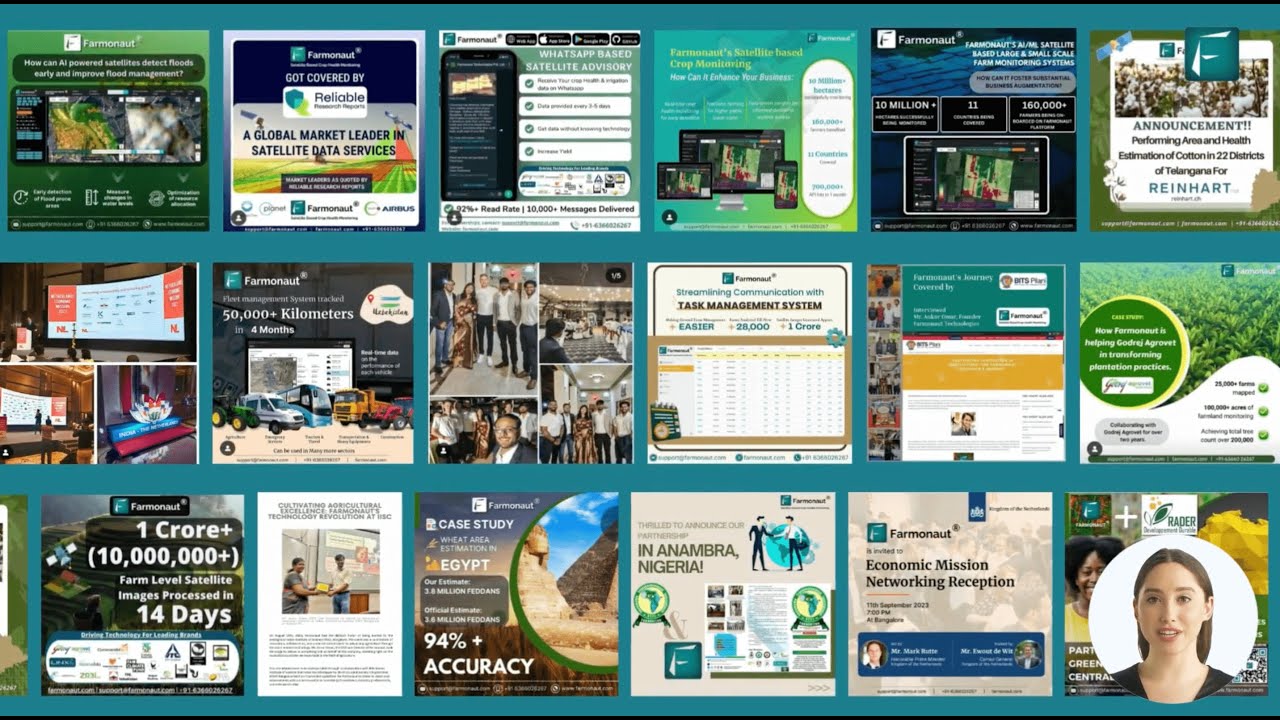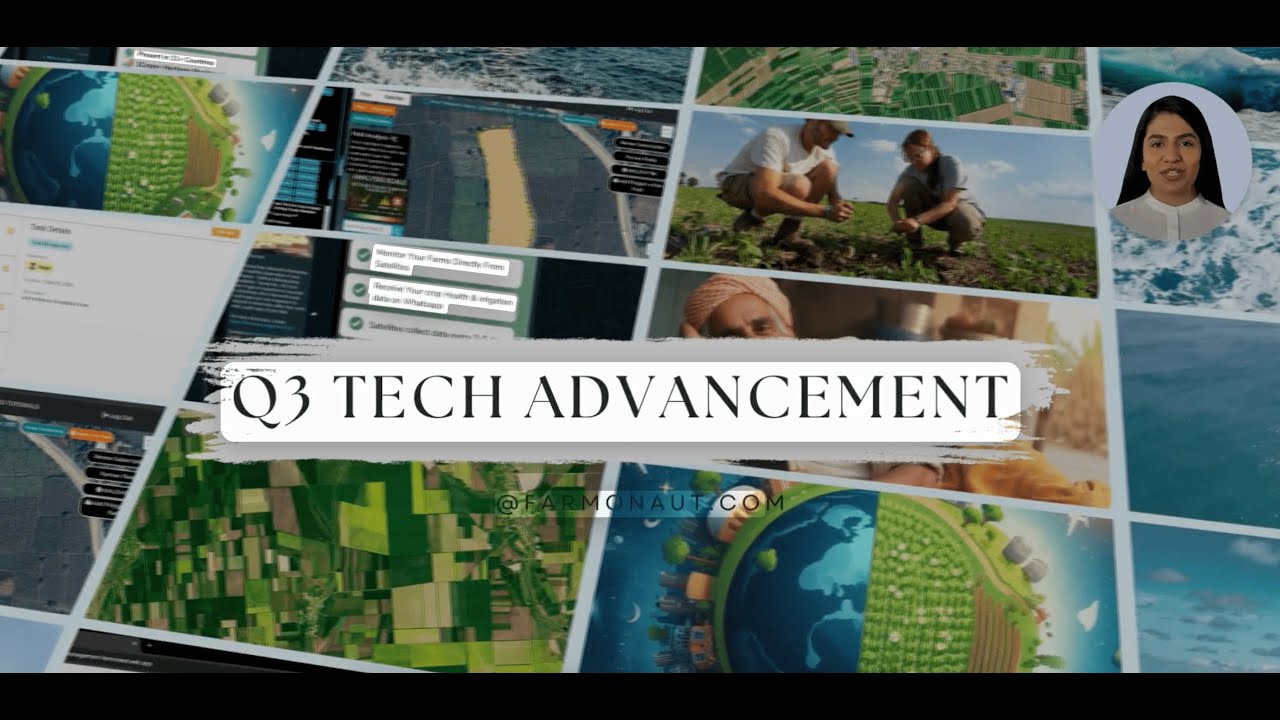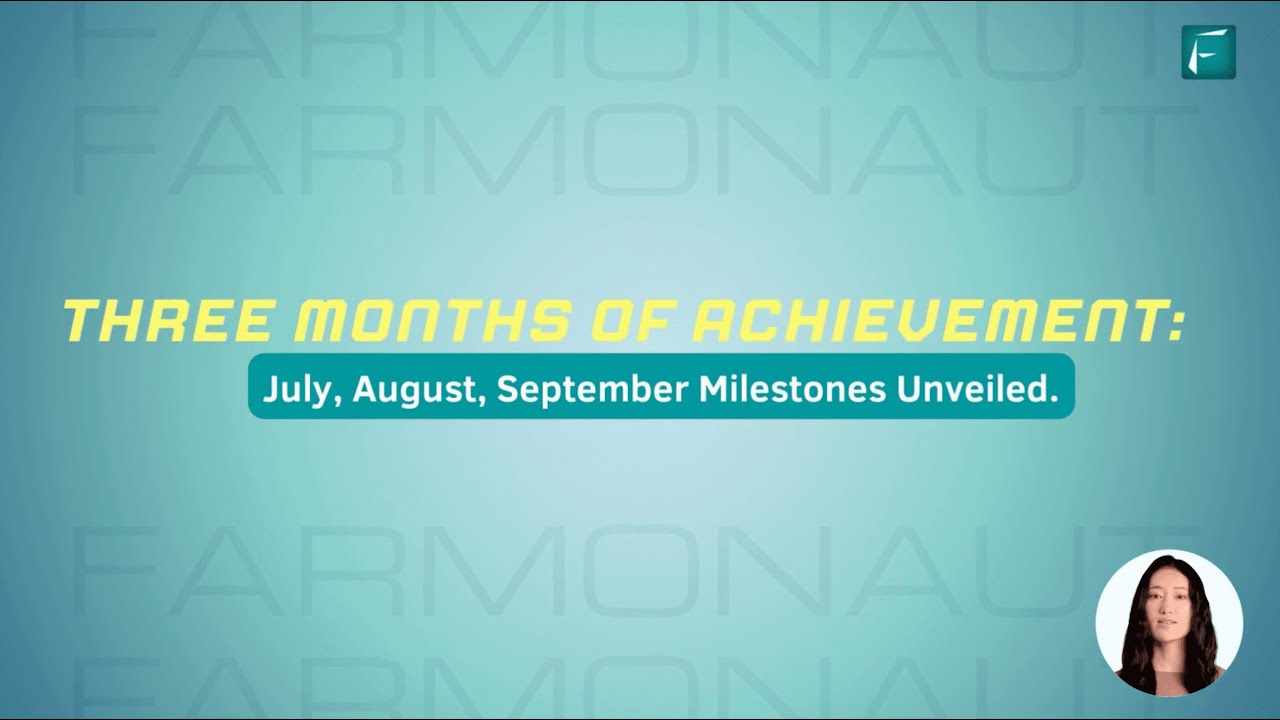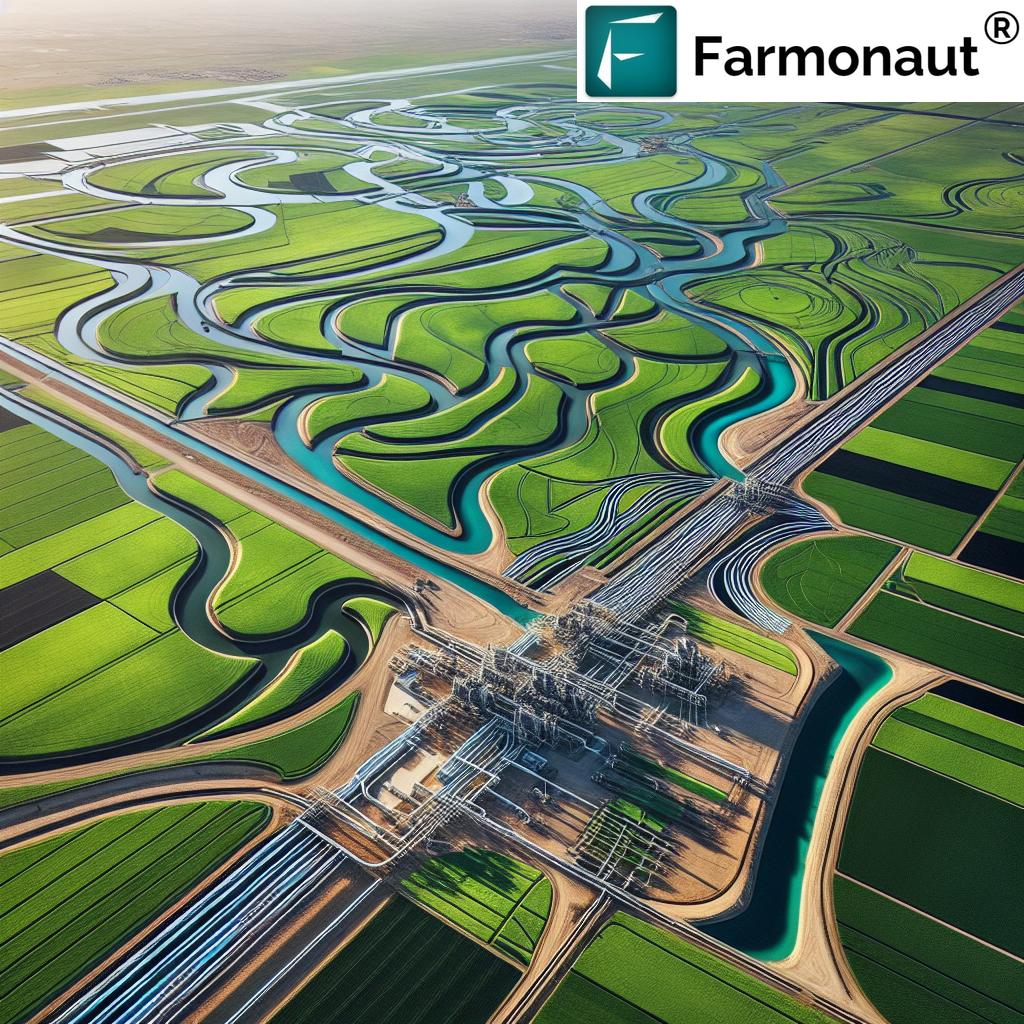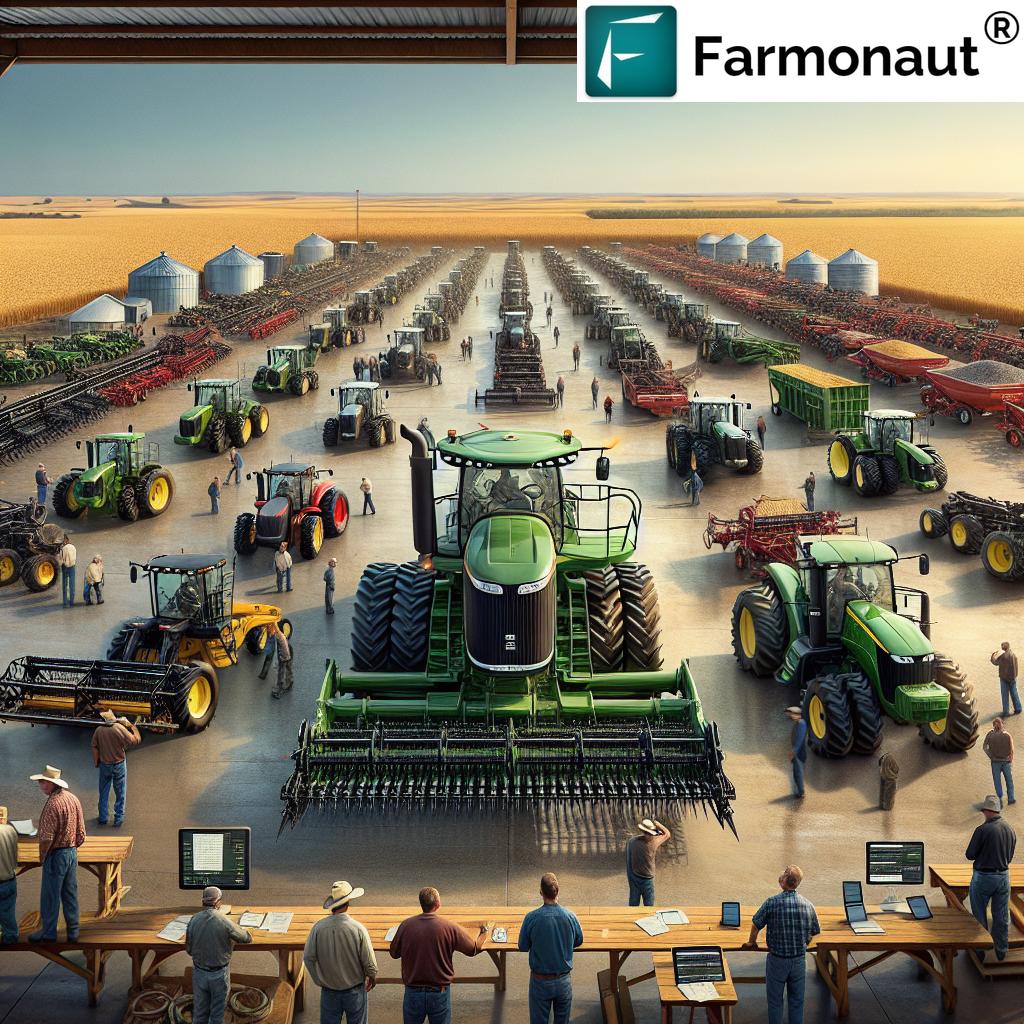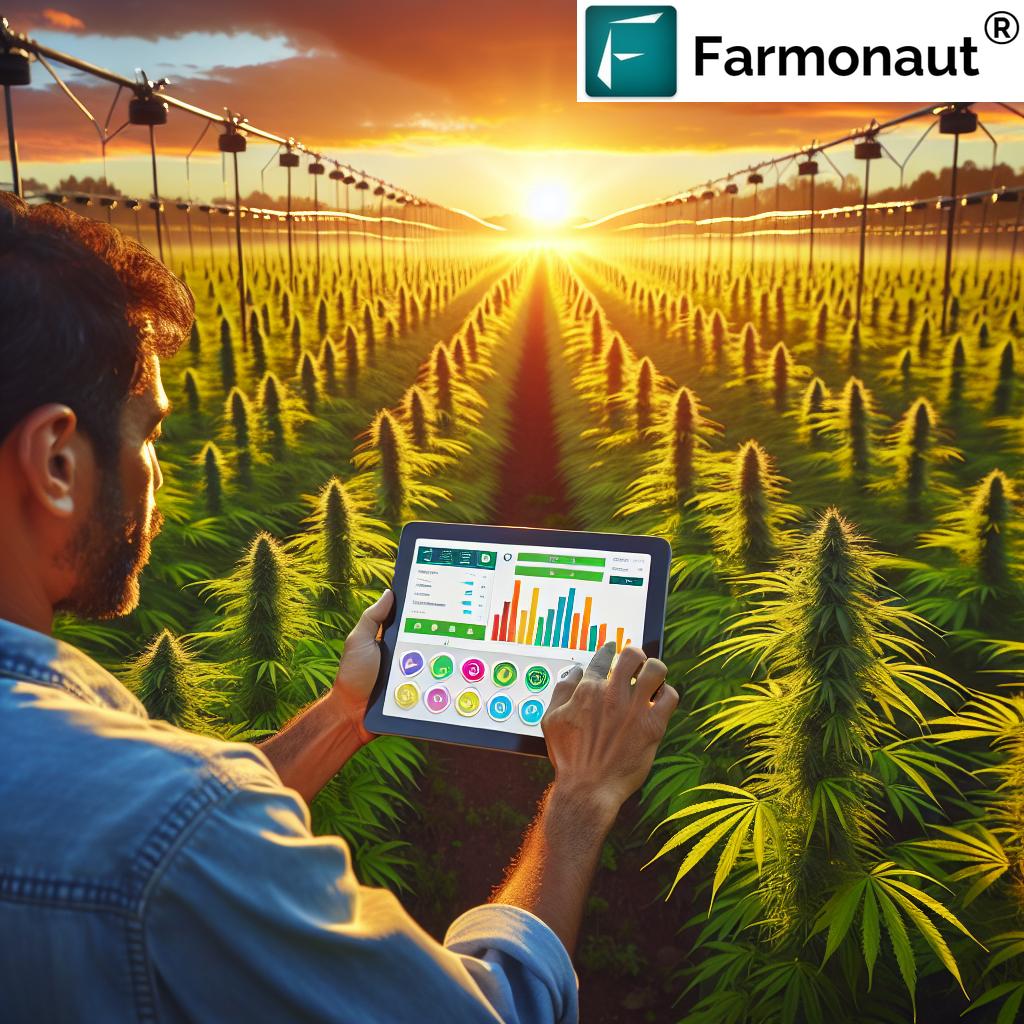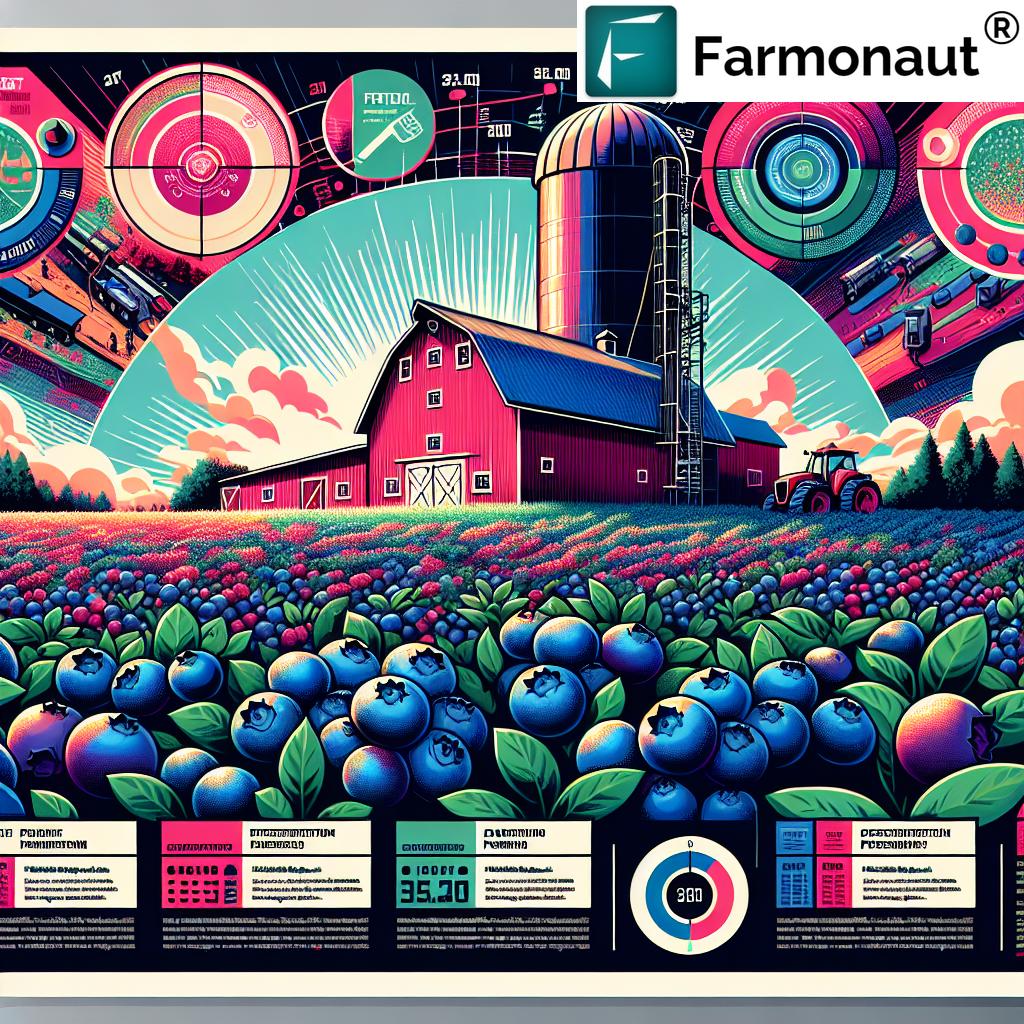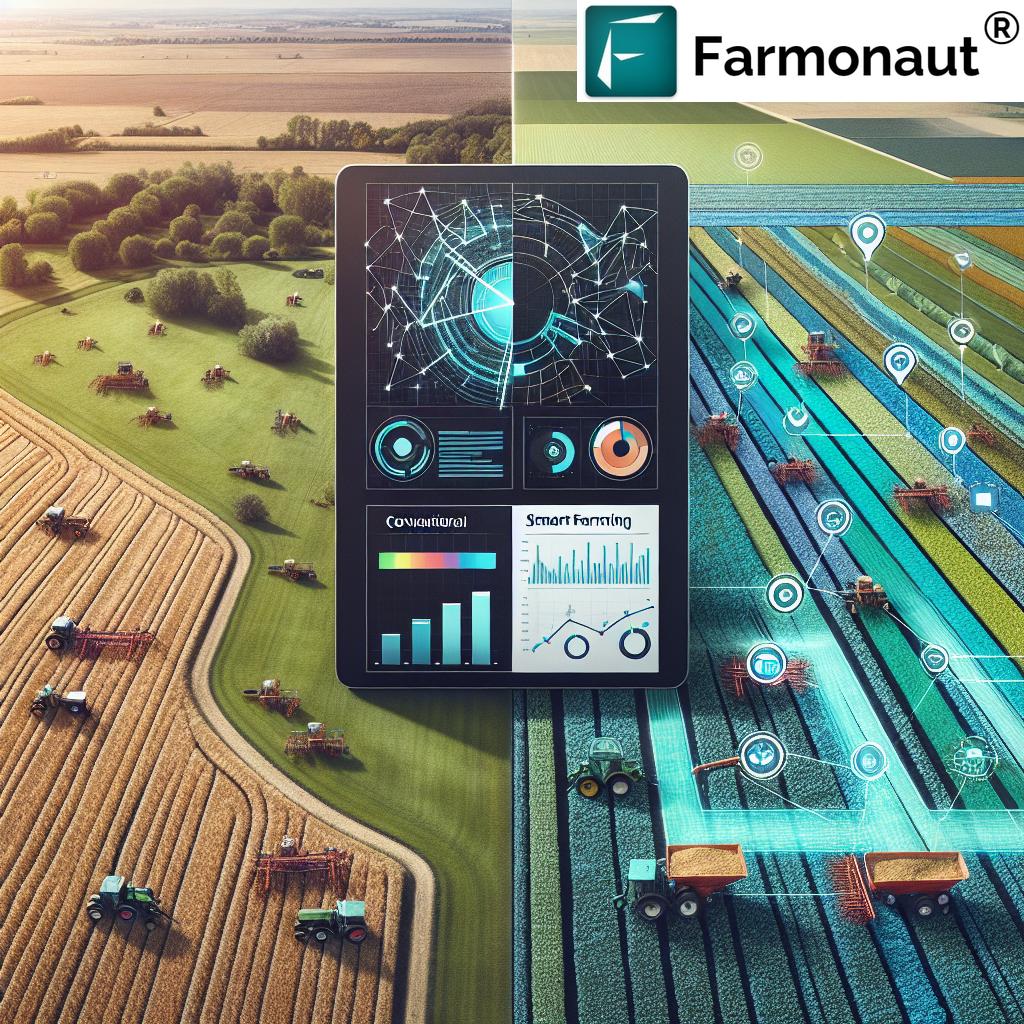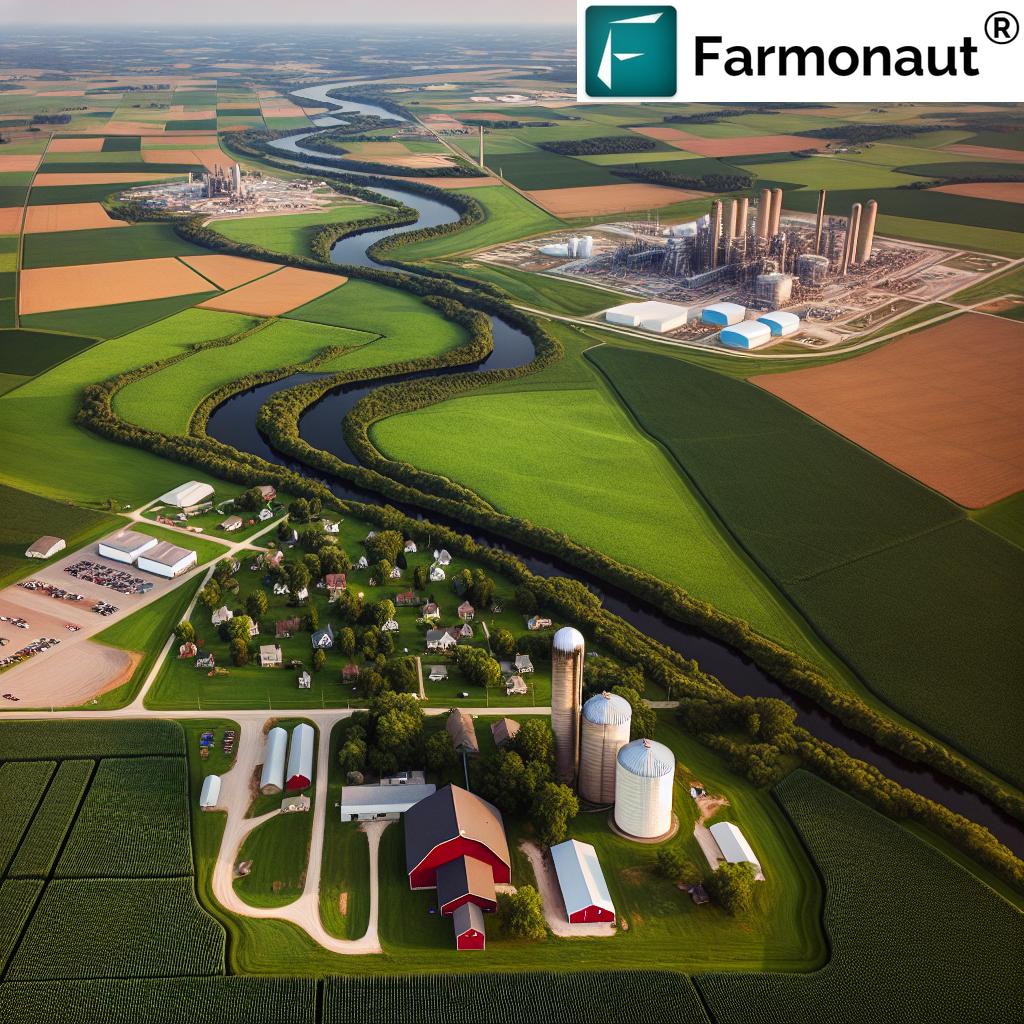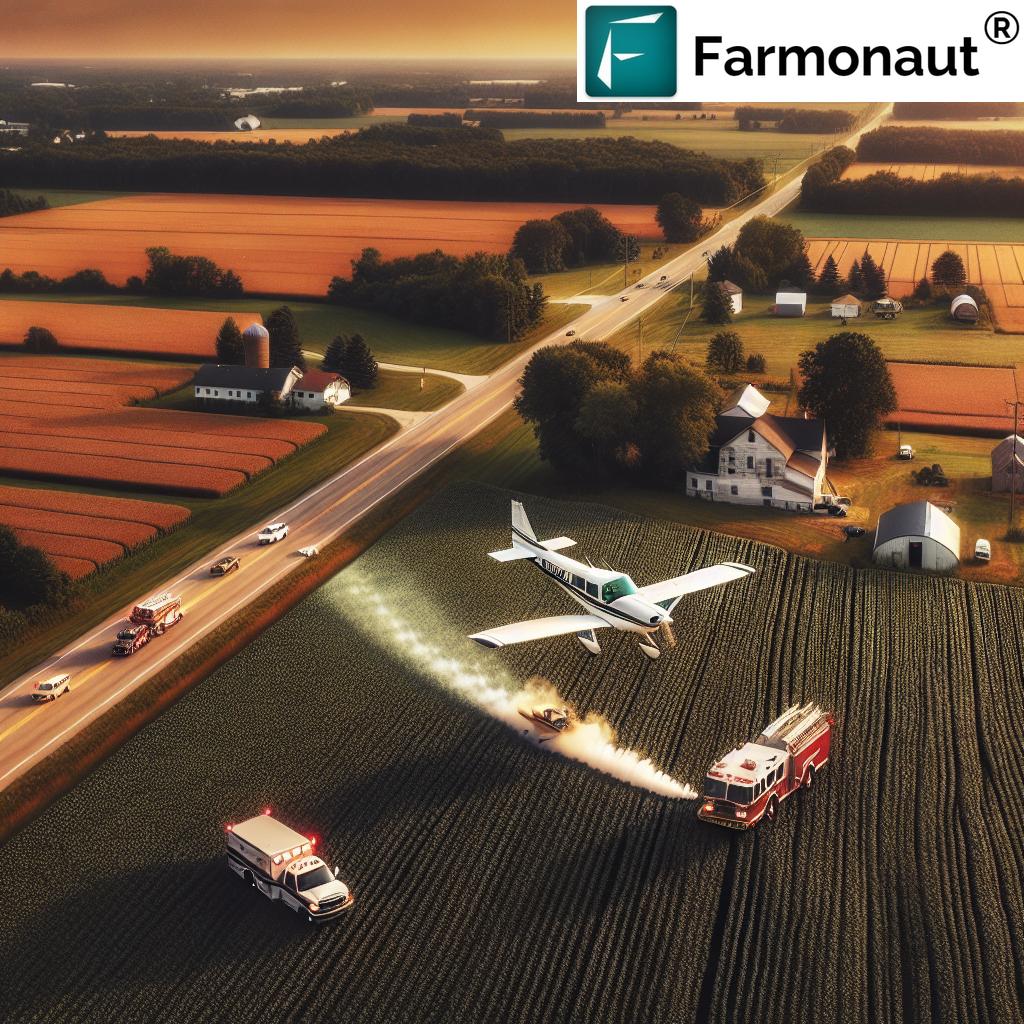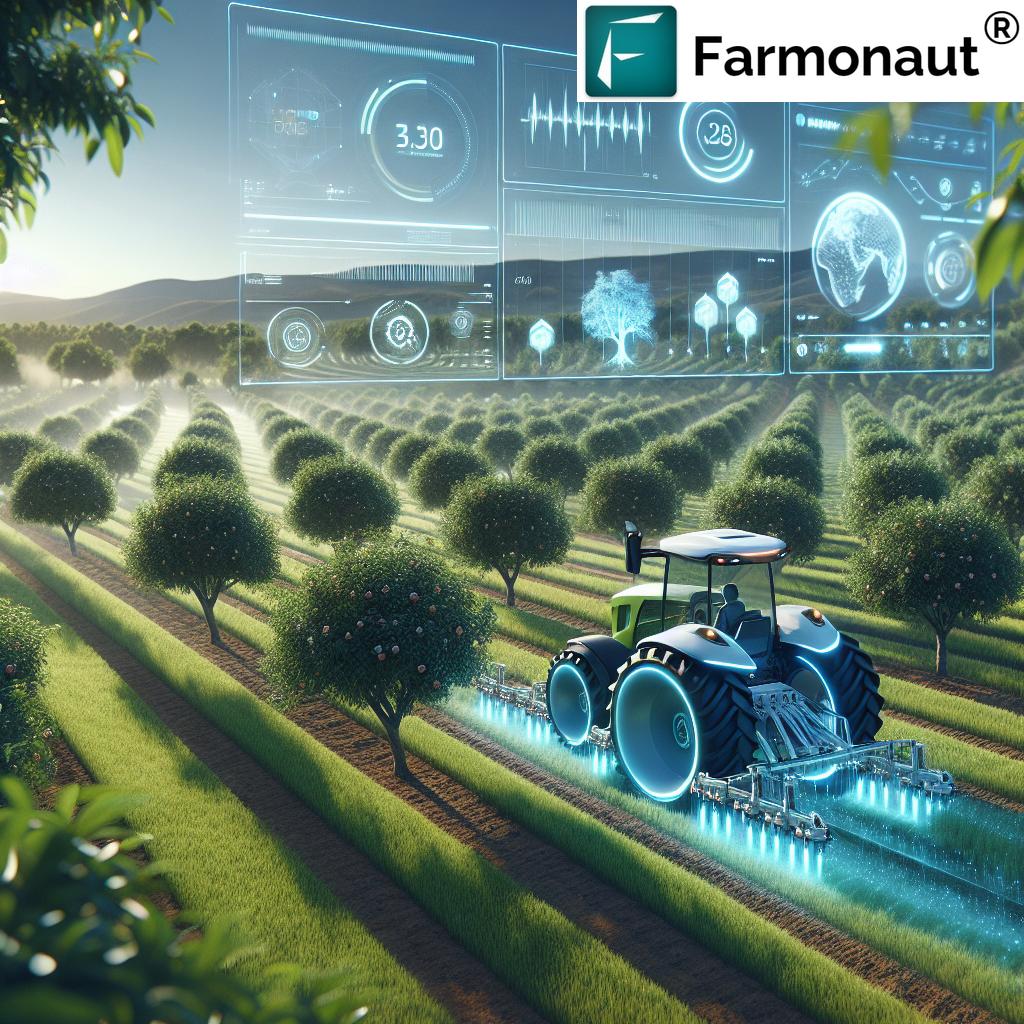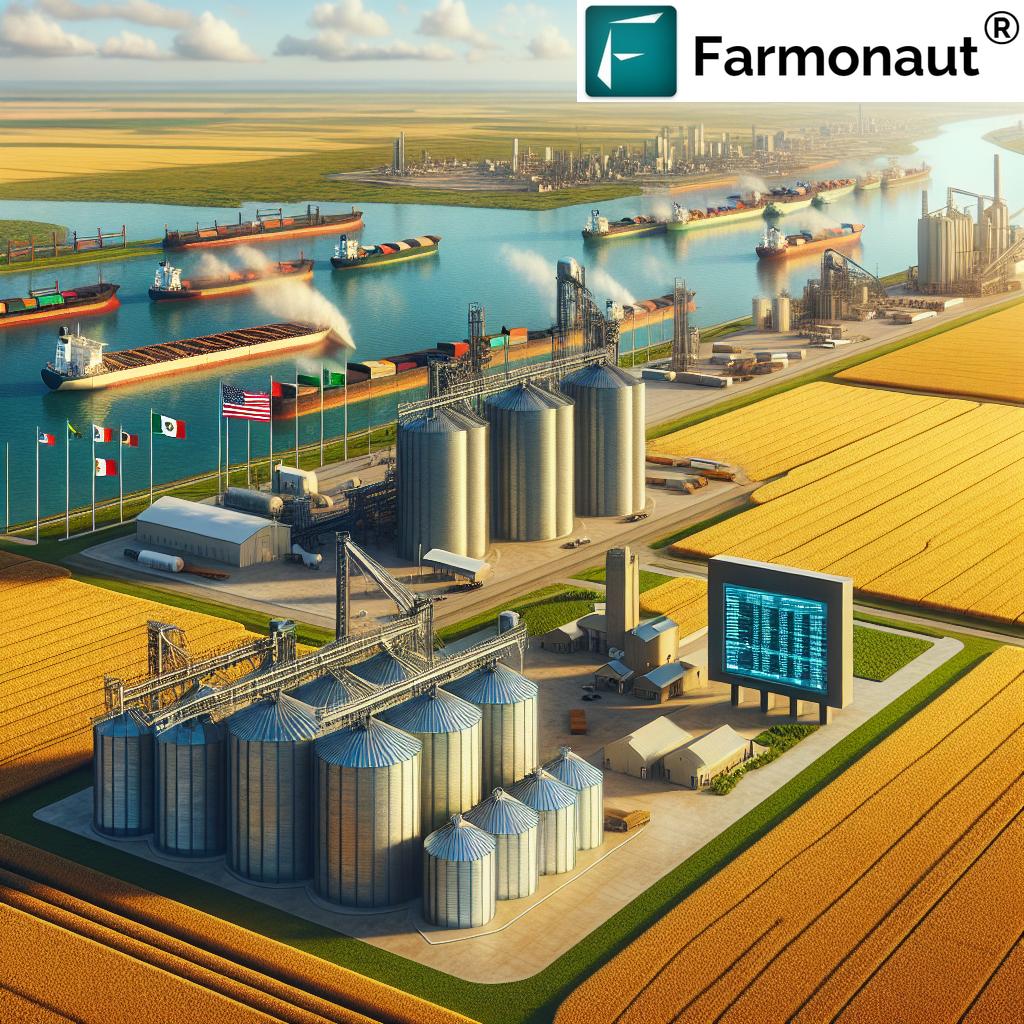Global Grain Industry Faces Upheaval: Geopolitical Challenges and Policy Shifts Impact Kansas City’s Agribusiness Landscape
“Geopolitical tensions in Ukraine and the Middle East have disrupted grain transportation logistics, affecting global agribusiness trends in 2024.”
In the heart of America’s breadbasket, Kansas City, Missouri, stands as a testament to the resilience and importance of the global grain industry. As we navigate through the tumultuous landscape of 2024, we find ourselves at a critical juncture where geopolitical challenges and policy shifts are reshaping the very foundation of agribusiness. The reverberations of these changes are felt not just in the sprawling fields of the Midwest but across the globe, from the war-torn regions of Ukraine to the shifting sands of the Middle East.
At Farmonaut, we’ve been closely monitoring these developments, leveraging our advanced satellite-based farm management solutions to provide insights into this complex situation. Our mission to make precision agriculture accessible to farmers worldwide has never been more crucial as we face these unprecedented challenges.
The Global Grain Industry: A Landscape in Flux
The global grain industry is experiencing a seismic shift, with multiple factors converging to create a perfect storm of challenges. Let’s delve into the key issues shaping this new reality:
- Geopolitical Tensions: The ongoing conflict in Ukraine, often referred to as Europe’s breadbasket, has severely disrupted grain production and export channels.
- Middle East Instability: Escalating conflicts in the Middle East have further complicated grain transportation logistics, impacting global supply chains.
- Conservative Policy Shifts: A notable rightward tilt in both European and American politics is influencing agricultural policies and international trade relations.
- Environmental Concerns: The urgent need for sustainable farming practices is clashing with short-term economic pressures and policy changes.
These factors have coalesced to create a volatile environment for grain producers, traders, and consumers alike. As we analyze these trends, it’s clear that the repercussions will be felt far beyond the immediate future, potentially reshaping the global food security landscape for years to come.
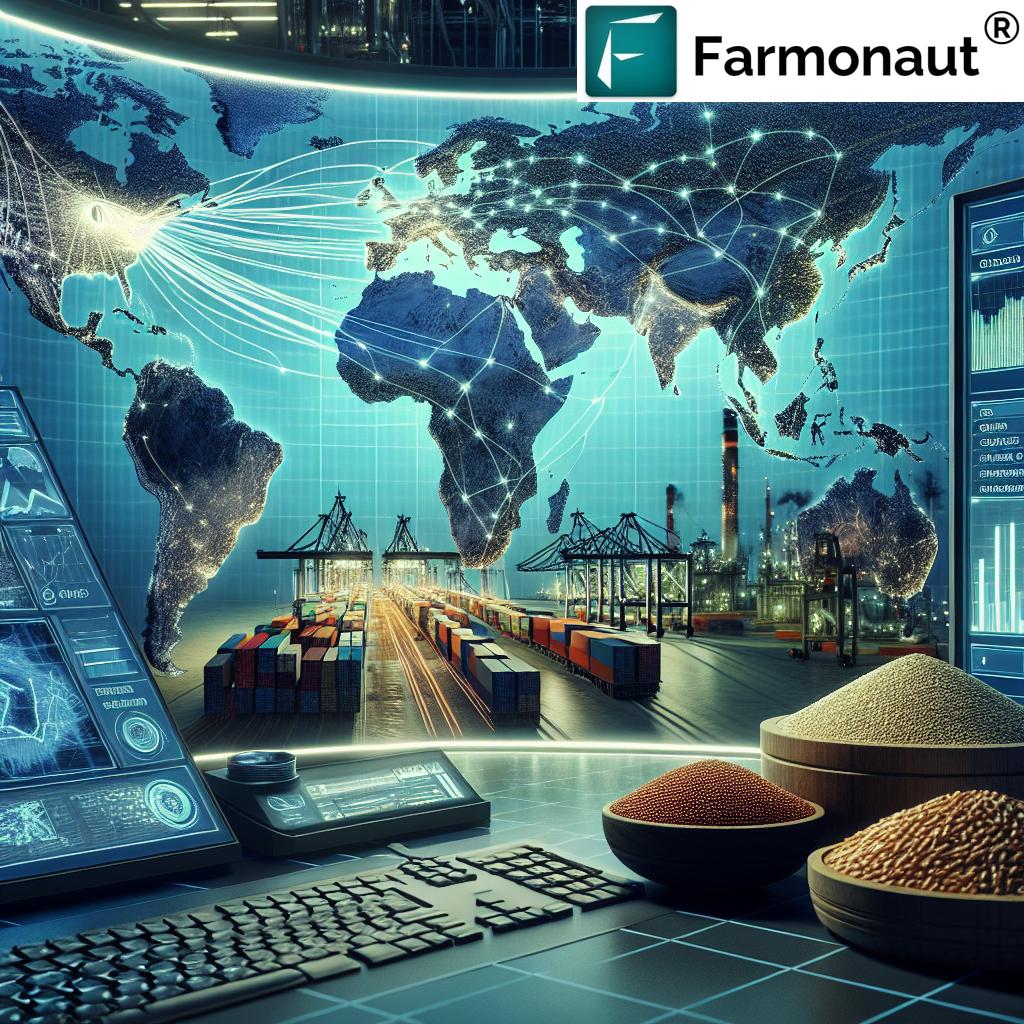
Geopolitical Challenges: The Ukraine-Middle East Nexus
The ongoing conflict in Ukraine has sent shockwaves through the global grain markets. As one of the world’s largest exporters of wheat, corn, and barley, Ukraine’s agricultural output plays a crucial role in global food security. The disruption caused by the conflict has led to:
- Reduced grain production in Ukraine’s fertile regions
- Blockades of Black Sea ports, hindering exports
- Increased global grain prices due to supply shortages
- Heightened food security concerns, especially in developing nations
Simultaneously, the escalating tensions in the Middle East have further complicated the situation. The region, a critical transit point for global trade, including grain shipments, is facing logistical challenges that are rippling through the supply chain. These disruptions are not just affecting the immediate area but are having far-reaching consequences on global grain transportation and distribution networks.
At Farmonaut, we’re utilizing our advanced GIS (Geographic Information Systems) technology to help stakeholders navigate these complex geopolitical waters. Our satellite-based crop health monitoring system provides real-time insights into agricultural production, helping to mitigate some of the uncertainties caused by these geopolitical challenges.
Policy Shifts: The Conservative Wave
“Conservative shifts in Europe and the US are influencing international grain trade barriers, impacting agricultural sustainability efforts worldwide.”
The political landscape in both Europe and the United States has seen a significant shift towards conservative policies. This ideological change is having profound implications for the grain industry:
- Trade Barriers: There’s a growing trend towards protectionist policies, potentially leading to new trade barriers in the international grain market.
- Environmental Policies: The focus on “green” agricultural practices is waning, with potential long-term consequences for sustainability efforts.
- Subsidy Changes: Alterations in agricultural subsidies could reshape the competitive landscape for grain producers globally.
- Research Funding: Shifts in government priorities may affect funding for agricultural research and development.
These policy changes are not occurring in isolation. They are intertwined with the broader geopolitical challenges, creating a complex web of factors influencing the global grain industry. For instance, the reemergence of Donald Trump as President in the United States after a four-year hiatus signals a potential return to more isolationist trade policies, which could have significant implications for grain exports from the American heartland, including Kansas City.
To help our users navigate these policy shifts, Farmonaut’s Jeevn AI Advisory System incorporates the latest policy information into its personalized farm advisory tools. This integration ensures that farmers and agribusinesses can make informed decisions in light of changing regulatory landscapes.
The Kansas City Connection: A Microcosm of Global Trends
Kansas City, Missouri, with its strategic location and rich agricultural heritage, serves as a bellwether for the global grain industry. The city’s response to these global challenges offers insights into how the broader industry might adapt:
- Logistics Hub: Kansas City’s role as a major logistics center for grain transportation is being tested by global supply chain disruptions.
- Market Volatility: The Kansas City Board of Trade, a key player in hard red winter wheat futures, is experiencing increased volatility due to global uncertainties.
- Technological Adoption: Local agribusinesses are increasingly turning to advanced technologies, like those offered by Farmonaut, to navigate market complexities.
- Policy Adaptation: The region’s agricultural sector is actively engaging with policymakers to address the impacts of national and international policy shifts.
As we at Farmonaut continue to support farmers and agribusinesses in Kansas City and beyond, we’re witnessing firsthand the resilience and adaptability of the agricultural community. Our satellite-based farm management solutions are helping local producers optimize their operations in the face of these global challenges.
The Role of Technology in Navigating Global Grain Challenges
In these turbulent times, technology is emerging as a crucial tool for the grain industry to navigate the complex interplay of geopolitical challenges and policy shifts. At Farmonaut, we’re at the forefront of this technological revolution in agriculture:
- Satellite-Based Crop Monitoring: Our advanced satellite imagery technology allows for real-time monitoring of crop health and soil conditions, enabling farmers to make data-driven decisions despite global uncertainties.
- AI-Powered Advisory Systems: The Jeevn AI system provides personalized recommendations, helping farmers adapt their strategies to changing market conditions and policy landscapes.
- Blockchain-Based Traceability: In an era of complex supply chains and increasing trade barriers, our blockchain solutions offer transparency and traceability in the grain industry.
- GIS in Agriculture: Geographic Information Systems are proving invaluable in analyzing the spatial impacts of geopolitical events on grain production and distribution.
These technological advancements are not just theoretical concepts but practical tools that are being implemented across the grain industry. From small family farms in the Midwest to large agribusinesses operating on a global scale, the adoption of these technologies is helping to mitigate risks and optimize operations in an increasingly unpredictable environment.
Explore Farmonaut’s cutting-edge solutions:
Environmental Policies in Agriculture: A Shifting Landscape
The conservative shift in global politics is having a profound impact on environmental policies in agriculture. This change is particularly significant given the urgent need for sustainable farming practices in the face of climate change:
- Rollback of Environmental Regulations: There’s a growing trend towards relaxing environmental standards in agriculture, potentially leading to increased use of pesticides and fertilizers.
- Reduced Focus on Sustainable Practices: The emphasis on sustainable farming methods is waning in some regions, raising concerns about long-term soil health and biodiversity.
- Climate Change Adaptation: Despite policy shifts, the reality of climate change continues to necessitate adaptive strategies in agriculture.
- Balancing Act: Farmers are increasingly caught between short-term economic pressures and long-term sustainability concerns.
At Farmonaut, we recognize the critical importance of sustainable agriculture, regardless of policy shifts. Our platform includes tools for carbon footprint tracking and resource optimization, helping farmers maintain environmentally friendly practices while navigating changing regulatory landscapes.
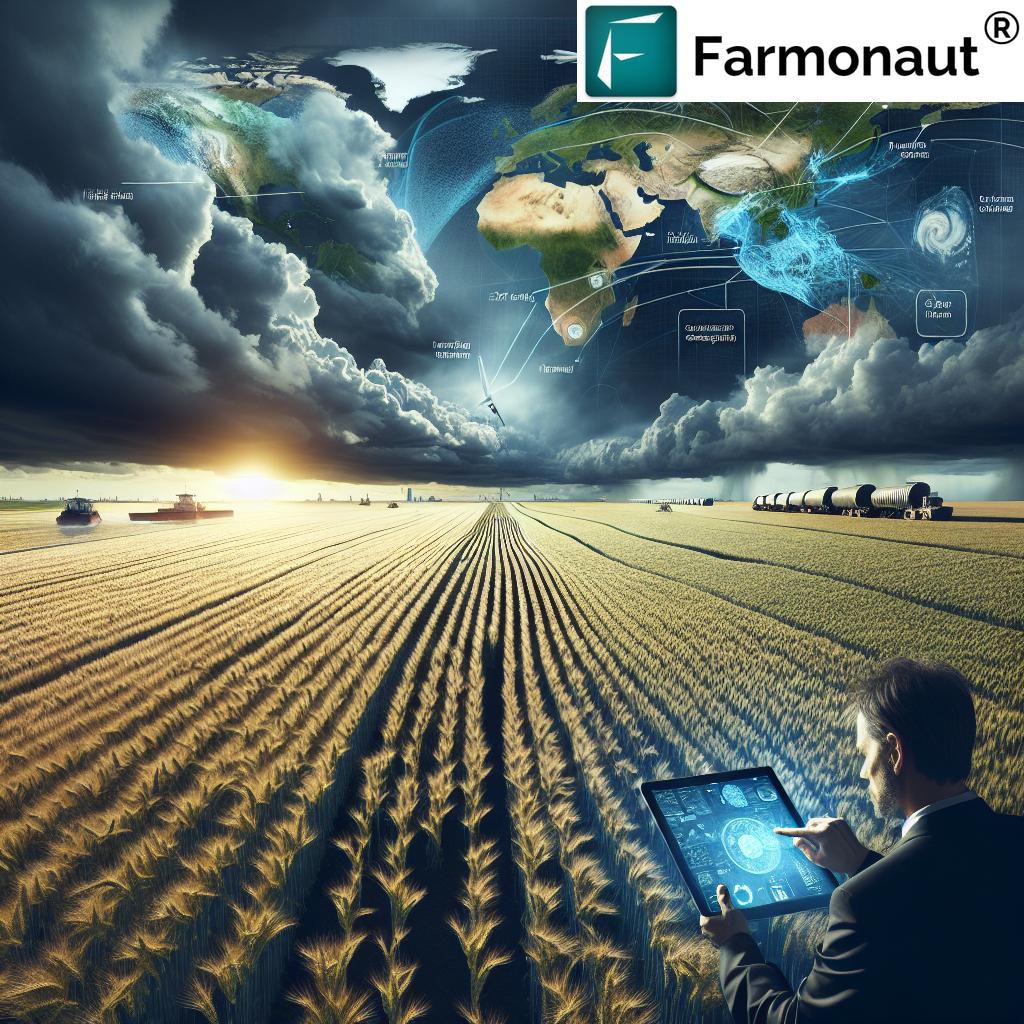
Global Food Security: The Long-Term Implications
The confluence of geopolitical challenges and policy shifts is raising serious concerns about global food security. As we analyze the situation, several key issues come to the forefront:
- Supply Chain Vulnerabilities: The disruptions in grain transportation have exposed weaknesses in global food supply chains.
- Price Volatility: Fluctuations in grain prices are having disproportionate impacts on developing nations, potentially leading to food crises.
- Shifting Trade Patterns: New trade barriers and geopolitical alliances are reshaping the flow of grain across the globe.
- Technological Divide: The gap between technologically advanced and traditional farming practices is widening, potentially exacerbating food security issues in certain regions.
These challenges underscore the need for a coordinated global response to ensure food security. At Farmonaut, we’re committed to democratizing access to advanced agricultural technologies, helping to bridge the gap between large-scale agribusinesses and smallholder farmers.
The Future of the Grain Industry: Adapting to a New Reality
As we look to the future, it’s clear that the global grain industry must adapt to a new reality shaped by geopolitical uncertainties and evolving policies. Here are some key trends and strategies that are likely to define the industry in the coming years:
- Diversification of Supply Chains: Countries and companies are likely to seek multiple sources for grain to reduce dependence on any single region.
- Technological Integration: The adoption of advanced technologies like those offered by Farmonaut will become increasingly crucial for maintaining competitiveness.
- Sustainable Innovation: Despite policy shifts, the push for sustainable farming practices will continue, driven by market demands and environmental realities.
- Local Production Emphasis: There may be a renewed focus on local and regional grain production to enhance food security.
- Policy Engagement: The grain industry will need to actively engage with policymakers to ensure regulations support both economic viability and sustainability.
At Farmonaut, we’re committed to supporting this adaptation process. Our platform is continuously evolving to meet the changing needs of the grain industry, from individual farmers to large-scale agribusinesses.
For developers interested in integrating our advanced agricultural data into their systems, explore our API:
Global Grain Industry Disruptions and Impacts
| Region/Country | Geopolitical Challenge | Policy Shift | Impact on Grain Industry |
|---|---|---|---|
| Ukraine | Ongoing conflict | Disrupted agricultural policies | Reduced production and exports, global supply shortages |
| Middle East | Regional instability | Changing trade agreements | Disrupted transportation routes, increased logistics costs |
| European Union | Political shifts | Conservative agricultural policies | Potential reduction in sustainable farming practices, new trade barriers |
| United States | Domestic political changes | Protectionist trade policies | Altered export dynamics, potential oversupply in domestic markets |
| Russia | International sanctions | Export restrictions | Market volatility, shifted global trade patterns |
| China | Geopolitical tensions | Food security-focused policies | Increased domestic production, altered import strategies |
| Brazil | Amazonian deforestation concerns | Changing environmental regulations | Potential expansion of grain production, environmental controversies |
| India | Climate change impacts | Self-sufficiency drive | Fluctuating export policies, increased focus on domestic consumption |
Conclusion: Navigating Uncertainty with Technology and Innovation
As we’ve explored throughout this analysis, the global grain industry is facing a period of unprecedented upheaval. The convergence of geopolitical challenges, policy shifts, and environmental concerns has created a complex landscape that requires innovative solutions and adaptive strategies.
In Kansas City and beyond, the grain industry is demonstrating remarkable resilience in the face of these challenges. The adoption of advanced technologies, like those offered by Farmonaut, is playing a crucial role in helping stakeholders navigate these turbulent waters. From satellite-based crop monitoring to AI-powered advisory systems, these tools are empowering farmers and agribusinesses to make informed decisions in an increasingly uncertain world.
As we look to the future, it’s clear that the grain industry will need to continue evolving. The emphasis on sustainability, despite policy shifts, will remain crucial for long-term viability. The diversification of supply chains and the strengthening of local production capabilities will be key strategies in ensuring global food security.
At Farmonaut, we remain committed to supporting the agricultural community through these challenges. By democratizing access to advanced agricultural technologies, we’re helping to level the playing field and ensure that farmers of all scales can thrive in this new reality.
The road ahead may be uncertain, but with innovation, adaptability, and a commitment to sustainable practices, the global grain industry can emerge stronger and more resilient than ever before.
FAQ: Global Grain Industry Challenges
- Q: How is the conflict in Ukraine affecting global grain markets?
A: The conflict has significantly reduced Ukraine’s grain production and exports, leading to global supply shortages and increased prices. - Q: What role does Kansas City play in the global grain industry?
A: Kansas City is a major logistics hub for grain transportation and home to the Kansas City Board of Trade, playing a crucial role in wheat futures trading. - Q: How are conservative policy shifts impacting agricultural practices?
A: Conservative policies are leading to potential rollbacks of environmental regulations and a reduced focus on sustainable farming practices in some regions. - Q: What technologies are helping farmers navigate current challenges?
A: Technologies like satellite-based crop monitoring, AI advisory systems, and blockchain-based traceability are helping farmers make informed decisions and optimize their operations. - Q: How is global food security being affected by current trends?
A: Global food security is facing challenges due to supply chain disruptions, price volatility, and changing trade patterns, particularly impacting developing nations.


